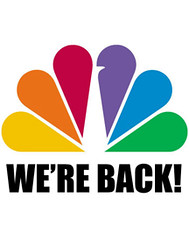With E! Online giving
hope to Friday Night Lights, a show given every advantage to build an audience over two seasons, and Michael Hinman reinforcing the decision to
axe Journeyman, a show given a half season in what has become NBC’s dead zone timeslot (as fans of The Black Donnellys know), some people are wondering if Nielsen ratings really mean anything.
After all, these two shows, on the same network, rack up about the same ratings. Unless, of course, you only count select beans.
The decision to cancel Journeyman had less to do with ratings and whether or not people watched the show and more to do with the financials of a hurting network, according to an unexpected source close to the show.Unfortunately for the fans, this means all the Rice-A-Roni on the planet is unlikely to change any minds at the network. In fact, the only reason ratings have been factored into the conversation is because that is how critics guess at network decisions. And sometimes, networks use these numbers to justify their decisions.
Why are Nielsen numbers only sometimes important? According to Nielsen: There are 5,000 households in the national People Meter sample, approximately 20,000 households in the local metered market samples, approximately 1,000 metered homes for our national and local Hispanic measurement, and nearly 1.6 million diaries are edited each year.In other words, on Nielsen’s best day, we can expect less than 2 percent of all television households to be sampled, which doesn’t even consider how many people lie (if you were a Jericho fan, chances are you would say you watched it, even if you did not). Or, in yet other words, Nielsen only sounds good when someone like Hinman writes it up like
this. Ho hum.
Don’t get me wrong, Hinman is a great guy and he presents a sound argument for the validity of Nielsen as critics want you to believe because they use these numbers to predict the fate of television. However, as someone with a foot in advertising, I do make media buy recommendations from time to time. There are a number of factors well beyond audience reach to consider.
Sometimes these other factors are simple. It makes sense to buy news for political candidates because people who watch the news tend to vote. Sometimes these other factors are about who else buys it. That’s why I recommended a water purifier company NOT buy 20 some radio spots on a station dominated by his competitor, complete with host endorsements. And sometimes these other factors might be about product placement, which is why Ford bought Knight Rider sight unseen.
And sometimes, it has to do with experience. Experience is why, years ago, I heavily recommended a local Ham Supreme retailer to place a good portion of its media buy on an unproven pilot program. The agency I was working for balked at the idea, insisting we buy a high frequency cable rotate instead. The result: Ham Supreme ran heavily at 3 a.m. in the morning instead of on a show that eventually climbed to number one. Why did I want the pilot? Psychographics suggested Home Improvement viewers might like big ham sandwiches.
My point is that the rating system has become little more than a tool to push perception instead of reality. How far from reality? Far enough from reality that when a show like Jericho, for example, is placed in a setting where every viewer is tracked, like TiVo viewers or iTunes downloads, it comes close to the top and looks more viable.
I could have made the same iTunes comparison for Journeyman or Friday Night Lights, but for all of NBC’s smart moves toward digital media, it
nixed selling shows on iTunes last Sept. in favor of a platform that doesn’t work on the market's dominant smart phone. When Journeyman was there; it did okay.
No matter, the networks and studios know all this, which is why Warner Bros. is testing emerging
technology; advertisers are looking to the
net; and networks have any number of
initiatives that are not connected to the rating system. (Hat tip: Jane Sweat.) Add all this up and ...
Nielsen isn’t nearly as relevant today as it once was and everybody knows it, but few will admit it. While that doesn’t mean it won’t be relevant in the future, it certainly means its primary relevance is a matter of convenience. It’s easy to blame the ratings or bypass them on any given Sunday, like today.So why was Journeyman cancelled? Look at the ratings and it seems to make sense, but the truth seems to be about budget. Why might Friday Night Lights be saved? The lower-budget show has critics who love to write about it and advertisers who like the psychographics.
Ho hum. Ratings smateings. Let's shoot for the truth.As more entertainment becomes available on the net, more people will be turning to the net more often. Advertisers tend to want to be where people might learn about and buy their products. And networks tend to want to
be where the advertisers want to be. Businesses that already have a Web presence in, um, social media, will be able to engage more people as opposed to simply slicing up their budgets across multiple media streams.
Networks and publishers will eventually win in this world too. For example, more people read The New York Times today than ever before. They made their decision after counting all the beans, not just the red ones. Advertising hasn't caught up, but it will. Bank on it.
So maybe what needs to be asked is this: in a world where analytics are pure, where's the need for Nielsen? Hinman says they'll measure everything in about five years. Five years? That's too late, considering I know how many people visit this blog without them.
Yeah, I know, media convergence seems so silly to so many people. But then again, these folks used the same arguments before: companies do not need Web sites; people will never use electronic mail; and Apple will never break into the phone market, let alone allow someone like me to connect my phone to my television and watch Supernatural. Right, none of those things will happen either.




















